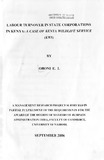| dc.description.abstract | This research project presents results of labour turnover in state corporations in Kenya.
This study was carried out to establish factors influencing labour turnover and pattern of
labour turnover in Kenya Wildlife Service.
Self administered questionnaires on a "drop" and "pick" basis were used to collect
primary data that was used to establish the factors influencing turnover. The data was run
through computer Software Package for Social Sciences (SPSS) that produced frequency
tables and percentages output.
Secondary data from KWS database was used to determine pattern of labour turnover.
The results indicate that the most influential factor contributing to labour turnover is low
pay. Other factors include lack of employee relations, lack of recognition, lack of career
prospects, discrimination/favoritism/tribalism, pursuit of further education, frustrations.
Findings also indicate that male employees are more likely to leave work than female,
young employees are more likely to leave work than old employees, most educated
employees are more likely to leave work than less educated, the less experienced are
more likely to leave work than the experienced and the non-married employees are more
likely to leave work than the married employees.
Furthermore, the results indicate that turnover rate at KWS has been decreasing over
years despite all the influential factors mentioned earlier. | en |

